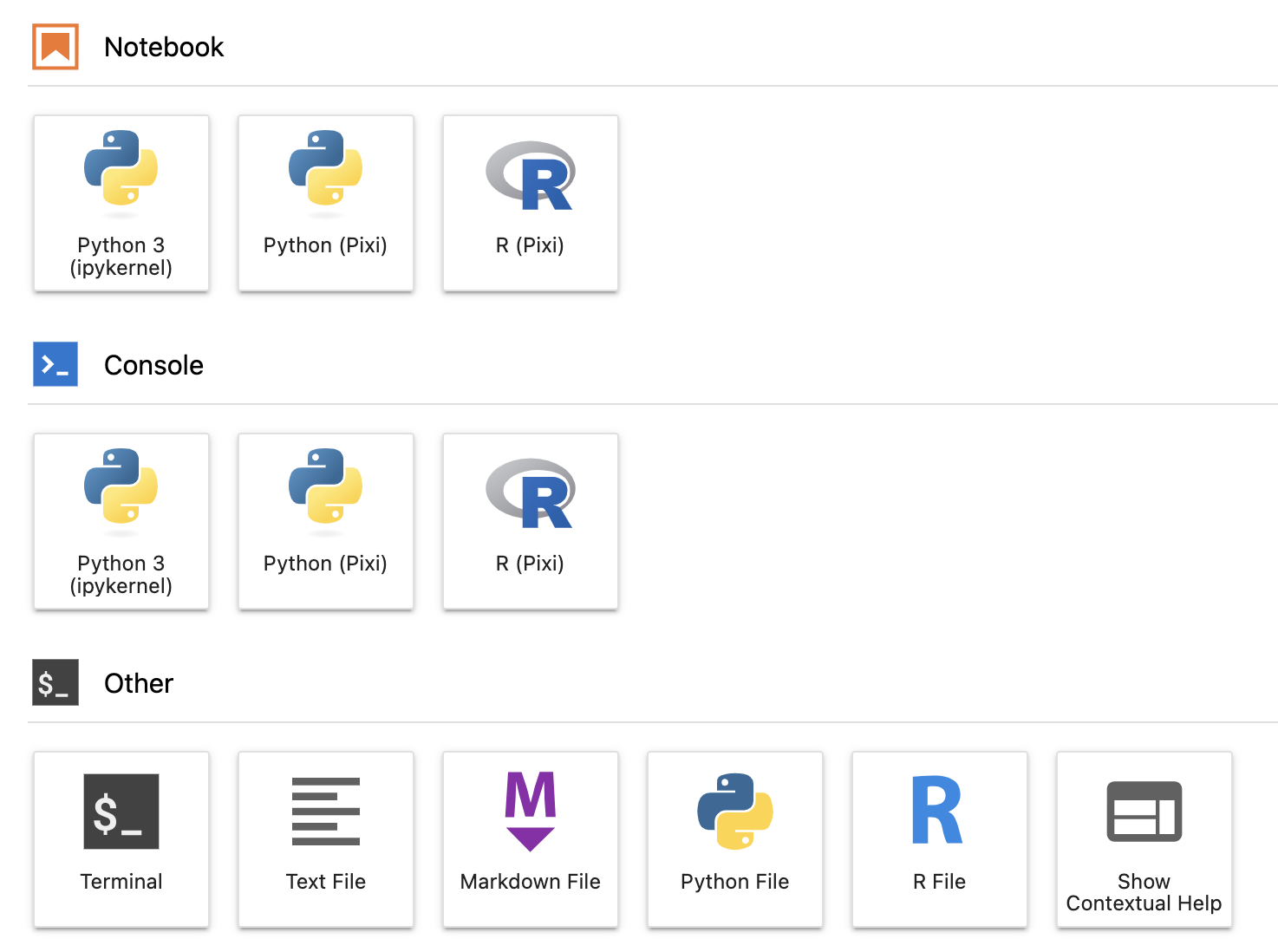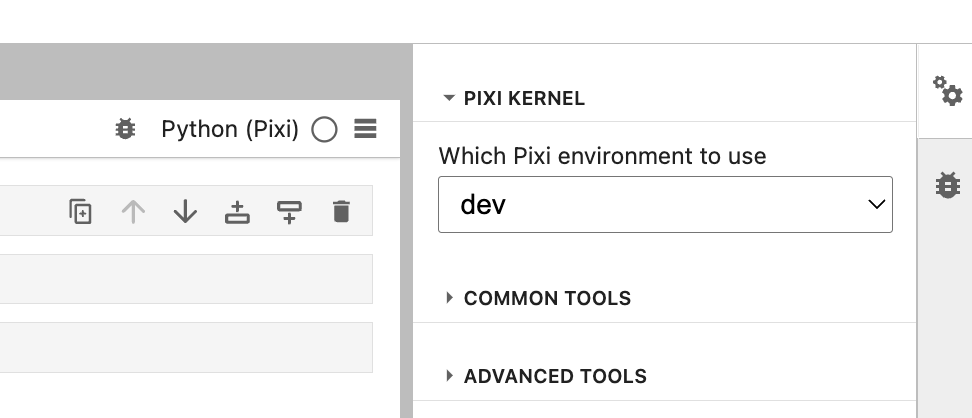# Pixi kernel
[](https://pypi.python.org/pypi/pixi-kernel)
[](https://pypi.python.org/pypi/pixi-kernel)
[](https://pypi.python.org/pypi/pixi-kernel)
[](https://github.com/renan-r-santos/pixi-kernel/actions)
[](https://codecov.io/gh/renan-r-santos/pixi-kernel)
[](https://github.com/astral-sh/uv)
[](https://github.com/astral-sh/ruff)
Per-directory Pixi environments with multi-language Jupyter kernels.
<!--- TODO: add theme selector when supported on PyPI https://github.com/pypi/warehouse/issues/11251 -->

Pixi kernel supports Jupyterlab 4, Python 3.9+ and Pixi 0.39.0+ using `pyproject.toml` and
`pixi.toml` configurations.
**Disclaimer**: _This project is not affiliated with Pixi, and not an official Pixi plugin._
## Quick Start
This assumes you want a Python kernel. For other languages, check the [Kernel
support](#kernel-support) table and replace `ipykernel` with the desired kernel package.
1. Install Pixi and `pixi-kernel` alongside JupyterLab using your favorite package manager.
2. Restart JupyterLab.
3. Create a new directory and initialize a Pixi project with `pixi init` and `pixi add ipykernel`.
4. Select the Python Pixi kernel and you are good to go.
See the [Pixi docs](https://pixi.sh/latest/) for more information on how to use Pixi.
## Configuration
### Custom Pixi binary location
By default, `pixi-kernel` will try to find the Pixi binary in this order:
1. Use `shutil.which("pixi")` to find Pixi in your PATH
2. Check for a configuration file stored at:
- Linux/macOS: `$HOME/.config/pixi-kernel/config.toml`
- Windows: `$Env:USERPROFILE\.config\pixi-kernel\config.toml`
3. Check the default Pixi installation location:
- Linux/macOS: `$HOME/.pixi/bin/pixi`
- Windows: `$Env:USERPROFILE\.pixi\bin\pixi.exe`
If you have Pixi installed in a non-standard location, you can create a configuration file to
specify its path:
```toml
pixi-path = "/path/to/your/pixi"
```
## Kernel support
Pixi kernel supports the following kernels:
| Language | Kernel | Package name |
| -------- | -------------- | -------------------------------------------------- |
| Python | IPython Kernel | [ipykernel](https://github.com/ipython/ipykernel) |
| R | IR Kernel | [r-irkernel](https://github.com/IRkernel/IRkernel) |
Support for other kernels and languages can be added by opening an issue or a pull request, see
[CONTRIBUTING](CONTRIBUTING.md#adding-support-for-new-kernels).
## Pixi environments
Pixi kernel supports multiple Pixi environments in a single Pixi project. To select a specific
environment, use JupyterLab property inspector, save your notebook and restart your kernel.

If an environment cannot be determined, Pixi kernel will fallback to the value in the
`PIXI_KERNEL_DEFAULT_ENVIRONMENT` environment variable, if specified. Otherwise, the `default` Pixi
environment will be used.
## JupyterHub deployments with limited permissions
If you're using pixi-kernel on JupyterHub and cannot access the environment where JupyterLab is
installed, you can use the following workaround:
1. Install `pixi-kernel` locally: `pip install pixi-kernel --user`
2. Install Pixi
3. Restart your JupyterLab server
See https://github.com/renan-r-santos/pixi-kernel/issues/62 and
https://github.com/renan-r-santos/pixi-kernel/issues/51 for more information.
## Limitations
Pixi kernel only works with the default environment in VSCode.
## Related
- [Pyproject Local Jupyter Kernel](https://github.com/bluss/pyproject-local-kernel)
- [Poetry-kernel](https://github.com/pathbird/poetry-kernel)
- [Python Local .venv Kernel](https://github.com/goerz/python-localvenv-kernel)
Raw data
{
"_id": null,
"home_page": null,
"name": "pixi-kernel",
"maintainer": null,
"docs_url": null,
"requires_python": "<4.0,>=3.9",
"maintainer_email": null,
"keywords": "jupyter, jupyterlab, jupyterlab-extension, kernel, pixi",
"author": null,
"author_email": "Renan Rodrigues dos Santos <renan.engmec@gmail.com>",
"download_url": "https://files.pythonhosted.org/packages/6e/95/5e25860c3f0c388efc8a66c37d65fccaee7842131dd977f54650fb8db9dd/pixi_kernel-0.6.5.tar.gz",
"platform": null,
"description": "# Pixi kernel\n\n[](https://pypi.python.org/pypi/pixi-kernel)\n[](https://pypi.python.org/pypi/pixi-kernel)\n[](https://pypi.python.org/pypi/pixi-kernel)\n[](https://github.com/renan-r-santos/pixi-kernel/actions)\n[](https://codecov.io/gh/renan-r-santos/pixi-kernel)\n[](https://github.com/astral-sh/uv)\n[](https://github.com/astral-sh/ruff)\n\nPer-directory Pixi environments with multi-language Jupyter kernels.\n\n<!--- TODO: add theme selector when supported on PyPI https://github.com/pypi/warehouse/issues/11251 -->\n\n\n\nPixi kernel supports Jupyterlab 4, Python 3.9+ and Pixi 0.39.0+ using `pyproject.toml` and\n`pixi.toml` configurations.\n\n**Disclaimer**: _This project is not affiliated with Pixi, and not an official Pixi plugin._\n\n## Quick Start\n\nThis assumes you want a Python kernel. For other languages, check the [Kernel\nsupport](#kernel-support) table and replace `ipykernel` with the desired kernel package.\n\n1. Install Pixi and `pixi-kernel` alongside JupyterLab using your favorite package manager.\n2. Restart JupyterLab.\n3. Create a new directory and initialize a Pixi project with `pixi init` and `pixi add ipykernel`.\n4. Select the Python Pixi kernel and you are good to go.\n\nSee the [Pixi docs](https://pixi.sh/latest/) for more information on how to use Pixi.\n\n## Configuration\n\n### Custom Pixi binary location\n\nBy default, `pixi-kernel` will try to find the Pixi binary in this order:\n\n1. Use `shutil.which(\"pixi\")` to find Pixi in your PATH\n2. Check for a configuration file stored at:\n - Linux/macOS: `$HOME/.config/pixi-kernel/config.toml`\n - Windows: `$Env:USERPROFILE\\.config\\pixi-kernel\\config.toml`\n3. Check the default Pixi installation location:\n - Linux/macOS: `$HOME/.pixi/bin/pixi`\n - Windows: `$Env:USERPROFILE\\.pixi\\bin\\pixi.exe`\n\nIf you have Pixi installed in a non-standard location, you can create a configuration file to\nspecify its path:\n\n```toml\npixi-path = \"/path/to/your/pixi\"\n```\n\n## Kernel support\n\nPixi kernel supports the following kernels:\n\n| Language | Kernel | Package name |\n| -------- | -------------- | -------------------------------------------------- |\n| Python | IPython Kernel | [ipykernel](https://github.com/ipython/ipykernel) |\n| R | IR Kernel | [r-irkernel](https://github.com/IRkernel/IRkernel) |\n\nSupport for other kernels and languages can be added by opening an issue or a pull request, see\n[CONTRIBUTING](CONTRIBUTING.md#adding-support-for-new-kernels).\n\n## Pixi environments\n\nPixi kernel supports multiple Pixi environments in a single Pixi project. To select a specific\nenvironment, use JupyterLab property inspector, save your notebook and restart your kernel.\n\n\n\nIf an environment cannot be determined, Pixi kernel will fallback to the value in the\n`PIXI_KERNEL_DEFAULT_ENVIRONMENT` environment variable, if specified. Otherwise, the `default` Pixi\nenvironment will be used.\n\n## JupyterHub deployments with limited permissions\n\nIf you're using pixi-kernel on JupyterHub and cannot access the environment where JupyterLab is\ninstalled, you can use the following workaround:\n\n1. Install `pixi-kernel` locally: `pip install pixi-kernel --user`\n2. Install Pixi\n3. Restart your JupyterLab server\n\nSee https://github.com/renan-r-santos/pixi-kernel/issues/62 and\nhttps://github.com/renan-r-santos/pixi-kernel/issues/51 for more information.\n\n## Limitations\n\nPixi kernel only works with the default environment in VSCode.\n\n## Related\n\n- [Pyproject Local Jupyter Kernel](https://github.com/bluss/pyproject-local-kernel)\n- [Poetry-kernel](https://github.com/pathbird/poetry-kernel)\n- [Python Local .venv Kernel](https://github.com/goerz/python-localvenv-kernel)\n",
"bugtrack_url": null,
"license": "MIT",
"summary": "Jupyter kernels using Pixi for reproducible notebooks",
"version": "0.6.5",
"project_urls": {
"Documentation": "https://github.com/renan-r-santos/pixi-kernel",
"Homepage": "https://github.com/renan-r-santos/pixi-kernel",
"Repository": "https://github.com/renan-r-santos/pixi-kernel"
},
"split_keywords": [
"jupyter",
" jupyterlab",
" jupyterlab-extension",
" kernel",
" pixi"
],
"urls": [
{
"comment_text": null,
"digests": {
"blake2b_256": "e7f24843925b62abade7c937d6c1a3d7ec6ade1768c6b9a6ddd2fbced2208630",
"md5": "caca0e23c3e826024dd70cda02640db7",
"sha256": "954a1f9875f19c1e133bca3569fbe8202db05387661344352e325cdfe512ccc8"
},
"downloads": -1,
"filename": "pixi_kernel-0.6.5-py3-none-any.whl",
"has_sig": false,
"md5_digest": "caca0e23c3e826024dd70cda02640db7",
"packagetype": "bdist_wheel",
"python_version": "py3",
"requires_python": "<4.0,>=3.9",
"size": 38979,
"upload_time": "2025-07-30T01:05:55",
"upload_time_iso_8601": "2025-07-30T01:05:55.181960Z",
"url": "https://files.pythonhosted.org/packages/e7/f2/4843925b62abade7c937d6c1a3d7ec6ade1768c6b9a6ddd2fbced2208630/pixi_kernel-0.6.5-py3-none-any.whl",
"yanked": false,
"yanked_reason": null
},
{
"comment_text": null,
"digests": {
"blake2b_256": "6e955e25860c3f0c388efc8a66c37d65fccaee7842131dd977f54650fb8db9dd",
"md5": "1deb683b3c0220a0e4b39a42159d7e17",
"sha256": "4ee12b9d28b638fa7e1f5a1101a64846a3d3eab256adb70b9830121052d78eb1"
},
"downloads": -1,
"filename": "pixi_kernel-0.6.5.tar.gz",
"has_sig": false,
"md5_digest": "1deb683b3c0220a0e4b39a42159d7e17",
"packagetype": "sdist",
"python_version": "source",
"requires_python": "<4.0,>=3.9",
"size": 709811,
"upload_time": "2025-07-30T01:05:56",
"upload_time_iso_8601": "2025-07-30T01:05:56.812407Z",
"url": "https://files.pythonhosted.org/packages/6e/95/5e25860c3f0c388efc8a66c37d65fccaee7842131dd977f54650fb8db9dd/pixi_kernel-0.6.5.tar.gz",
"yanked": false,
"yanked_reason": null
}
],
"upload_time": "2025-07-30 01:05:56",
"github": true,
"gitlab": false,
"bitbucket": false,
"codeberg": false,
"github_user": "renan-r-santos",
"github_project": "pixi-kernel",
"travis_ci": false,
"coveralls": false,
"github_actions": true,
"tox": true,
"lcname": "pixi-kernel"
}
